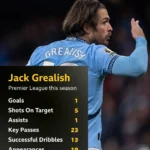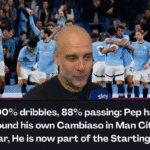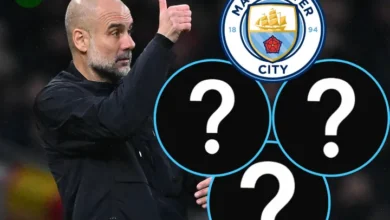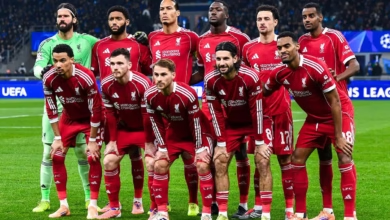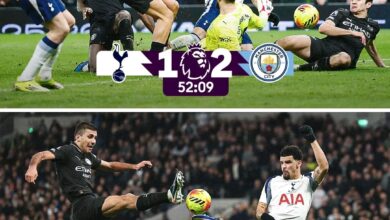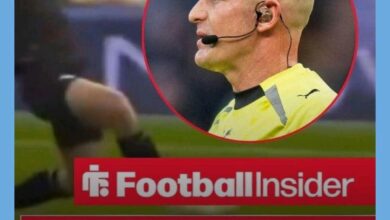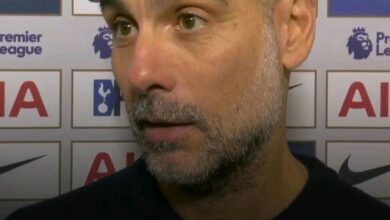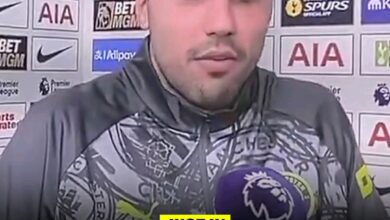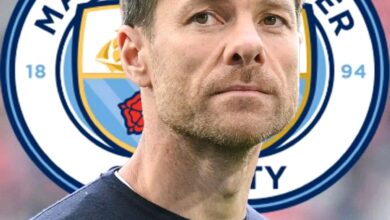Manchester City Star Facing Critical Career Decision
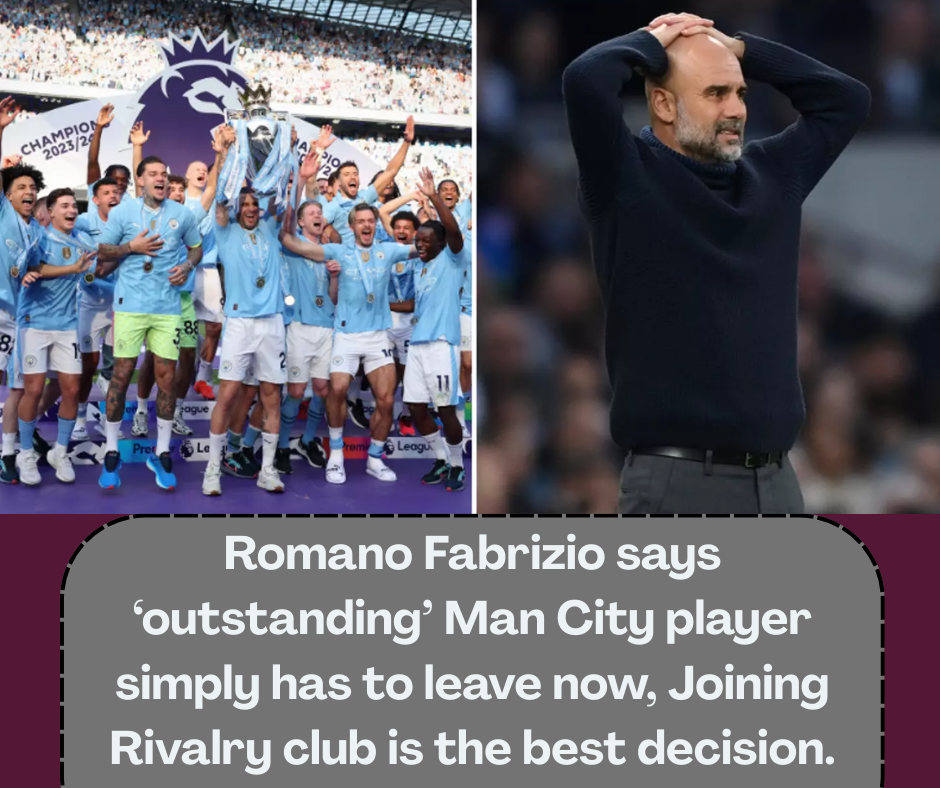
Manchester City took a significant step toward securing Champions League football for next season with a dramatic 2-1 victory over Aston Villa on Tuesday night. The win, courtesy of Bernardo Silva’s opener and Matheus Nunes’ 94th-minute winner, propelled Pep Guardiola’s men to third place in the Premier League standings, strengthening their position in what has been an uncharacteristically challenging season for the reigning champions.
Yet amid the celebrations at the Etihad Stadium, the continued absence of Jack Grealish from City’s matchday plans has become impossible to ignore. The £100 million man was once again left as an unused substitute, marking his third consecutive match with minimal or no playing time. This development has prompted former Scotland international and respected pundit Ally McCoist to declare that Grealish “simply has to leave now” if he hopes to resurrect his career.
“I think he has got to, just for his own career,” McCoist stated firmly on talkSPORT’s morning show. “The way I am looking at it, if Jack can’t get game time in a Manchester City team that has been really struggling, not now, but when is he going to get game time? He has got to be playing at this stage of his career.”
McCoist’s assessment comes at a critical juncture for the 29-year-old Grealish, who finds himself increasingly marginalized in Guardiola’s plans despite reports suggesting he wishes to remain at the club beyond this summer.
| Position | Team | Played | Won | Drawn | Lost | For | Against | Diff | Points |
|---|---|---|---|---|---|---|---|---|---|
| 1 | Liverpool | 33 | 24 | 7 | 2 | 75 | 31 | 44 | 79 |
| 2 | Arsenal | 33 | 18 | 12 | 3 | 61 | 27 | 34 | 66 |
| 3 | Manchester City | 34 | 18 | 7 | 9 | 66 | 43 | 23 | 61 |
| 4 | Nottingham Forest | 33 | 18 | 6 | 9 | 53 | 39 | 14 | 60 |
With nine losses already this season—more than in any of their previous title-winning campaigns under Guardiola—City have been forced to adapt their approach. Tuesday’s match against Aston Villa featured Omar Marmoush as the only natural winger in the starting eleven, reflecting Guardiola’s ongoing tactical adjustments.
The introduction of Jeremy Doku as a substitute proved decisive, with the Belgian providing the assist for Nunes’ winner. Yet Grealish, once considered a cornerstone of City’s attacking options, remained rooted to the bench throughout the 90 minutes, continuing a worrying trend that has seen his involvement diminish dramatically in recent weeks.
When Manchester City broke the British transfer record to sign Grealish from Aston Villa in August 2021, expectations were stratospheric. Here was a player who had captained his boyhood club, established himself as an England international, and displayed the kind of creative flair that seemed tailor-made for Guardiola’s possession-based philosophy.
The transfer represented not just a footballing decision but a statement of intent from City. Grealish was to be the face of the club’s marketing campaigns, a Premier League poster boy whose charisma and skill would help elevate City’s global profile even further.
Initially, there were promising signs. Grealish played a significant role in City’s 2021-22 Premier League-winning campaign, gradually adapting to Guardiola’s exacting tactical demands. The following season saw him contribute importantly to the historic treble, with improved performances suggesting he had finally found his feet at the highest level.
Dion Dublin, speaking on Match of the Day in April 2024, described Grealish as “outstanding” following a particularly impressive performance against Crystal Palace, in which the winger displayed the kind of direct running and creative decision-making that had become his trademark at Villa Park.
“When Grealish plays with this kind of confidence, he transforms City’s attack,” Dublin observed at the time. “He gives them a different dimension with his ability to hold onto possession in tight spaces and create opportunities seemingly out of nothing.”
Yet that promise has faded during the current campaign. Injuries, loss of form, and increasing competition for places have seen Grealish’s stock fall dramatically. In recent weeks, his game time has dwindled to virtually nothing—three minutes against Crystal Palace followed by consecutive matches as an unused substitute.
Pep Guardiola’s relationship with Grealish has been complex from the beginning. The Spanish tactician has always demanded tactical discipline and positional awareness from his attacking players, qualities that don’t always come naturally to free spirits like Grealish.
Early in their relationship, Guardiola spoke about the need for patience. “Jack will need time to understand our movement, but when he settles, the quality he has shown at Aston Villa and with the national team will emerge,” he said during Grealish’s first season at the club.
That patience appears to have worn thin. Guardiola’s recent team selections suggest he has moved away from traditional wingers in certain matches, preferring more versatile forwards who can interchange positions and offer greater defensive diligence. When wide attackers are deployed, Jeremy Doku’s explosive pace and Omar Marmoush’s direct running seem to be preferred options.
Following the Villa match, Guardiola was typically cryptic when asked about Grealish’s absence. “We need all the squad. Jack is an important player who has helped us win important trophies. But every game demands different qualities and today we needed specific profiles.”
Reading between the lines, it appears Grealish no longer fits the profile Guardiola wants for his evolving team. Reports from inside the club suggest City would be open to selling the player this summer, a remarkable turnaround for someone who was supposed to represent the future of the club just three years ago.
McCoist’s assessment of Grealish’s situation carries additional weight when considering the broader context of international football. With the 2026 World Cup on the horizon, England players are entering a crucial period where regular playing time will be essential to securing their places in Thomas Tuchel’s squad.
“Next season is absolutely critical for any player with World Cup ambitions,” noted former England defender Gary Neville during Sky Sports’ coverage of the City-Villa match. “Tuchel will be looking for players who are not just talented but match-sharp and playing regularly at the highest level. Jack can’t afford another season on the bench if he wants to be on that plane to North America.”
Grealish has been a regular in England squads when fit, with his creativity and ability to win free-kicks in dangerous areas valued on the international stage. However, his diminishing role at club level threatens to undermine his international prospects at a time when England’s attacking options have never been stronger.
The emergence of younger talents like Crystal Palace’s Michael Olise, Newcastle’s Anthony Gordon, and Chelsea’s Noni Madueke has intensified competition for England’s wide attacking positions. Even established stars like Bukayo Saka, Phil Foden, and Marcus Rashford cannot take their places for granted under Tuchel’s meritocratic approach.
For Grealish, this creates a perfect storm: declining minutes at club level coinciding with increasing competition for international places, all with a World Cup looming large on the horizon.
If Grealish does decide to seek a new challenge, there would be no shortage of Premier League clubs interested in acquiring his services. Reports suggest several top-flight teams are monitoring his situation, though the financial package required to secure his signature would limit the field of realistic contenders.
A return to Aston Villa has been mooted in some quarters, with the club now established as Champions League contenders under Unai Emery. Such a homecoming would certainly appeal romantically, but whether Villa could accommodate Grealish’s wages or would be willing to invest heavily in a player approaching 30 remains questionable.
Newcastle United, backed by Saudi Arabia’s Public Investment Fund, have the financial muscle to make such a deal happen. The Magpies’ project continues to gather momentum, and adding a player of Grealish’s profile would align with their ambitions to become a genuine force in English football.
Tottenham Hotspur represent another potential destination, particularly if they lose Son Heung-min this summer as some reports have suggested. Grealish’s creativity and flair would appeal to the north London club’s traditional values, while the opportunity to work under Ange Postecoglou’s attack-minded philosophy could reignite his career.
Outside England, few clubs could match Grealish’s current salary package. Paris Saint-Germain have historically shown interest in Premier League talent, but their recent pivot toward younger players might rule out a move for Grealish. Similarly, the major Spanish clubs appear to be focusing on developing youth rather than making statement signings for established stars.
From Manchester City’s perspective, the decision to potentially part ways with Grealish is multifaceted. The club has never been hesitant to move players on when they no longer fit the manager’s plans, regardless of reputation or transfer fee.
Financial fair play considerations also come into play. Despite their enormous resources, City operate under the same regulatory framework as other Premier League clubs. Recouping a significant portion of the £100 million invested in Grealish would help balance the books and create room for new acquisitions.
City’s recruitment strategy has evolved since Grealish’s arrival. The successful integration of younger talents like Erling Haaland and Joško Gvardiol suggests a shift toward investing in players with both immediate impact and long-term potential. At 29, Grealish falls outside this preferred demographic, especially if he’s not contributing regularly to the first team.
There are also indications that Guardiola is planning yet another tactical evolution. The manager, who recently extended his contract until 2027, appears to be laying the groundwork for City’s next iteration—one that may prioritize positional flexibility and defensive solidity over individual flair in certain positions.
For Grealish himself, the decision ahead is perhaps the most significant of his career. Having realized his ambition of playing for a super club and winning major trophies, he must now determine whether the prestige of being a Manchester City player outweighs the fundamental desire of any footballer: to play regularly.
John Terry, who witnessed Grealish’s development at Aston Villa first-hand as assistant coach, recently expressed concern about his former protégé’s situation.
“I’m worried for Jack, if I’m honest,” Terry said during a podcast appearance last month. “He’s such a talented player who needs to be expressing himself on the pitch. At his age, these should be his peak years, and he can’t afford to be watching from the sidelines.”
Terry stopped short of explicitly advising Grealish to leave City but emphasized the importance of regular football: “Only Jack can decide what’s right for his career, but what I do know is that he’s at his best when he feels valued and gets a consistent run of games. That’s when the Jack Grealish magic happens.”
The financial implications of any move cannot be ignored. Grealish’s reported weekly salary of £300,000 would be beyond the reach of most clubs, meaning he might need to accept a pay cut to secure regular football elsewhere. Such considerations often complicate seemingly straightforward sporting decisions.
The immediate backdrop to the renewed discussion about Grealish’s future was City’s crucial win over Aston Villa—ironically, the club where he made his name. Tuesday’s match showcased both City’s enduring quality and the new reality Grealish faces.
Bernardo Silva, operating in one of the wide attacking positions Grealish might once have occupied, opened the scoring with a typically intelligent finish. Gary Neville, commentating for Sky Sports, was effusive in his praise: “That’s why Bernardo starts these big games. His tactical intelligence is second to none, and he always delivers in key moments.”
When City needed fresh impetus in the closing stages, it was Jeremy Doku who got the call from the bench, not Grealish. The Belgian justified Guardiola’s faith with a brilliant assist for Nunes’ dramatic winner, highlighting the effective options City possess even without their £100 million man.
The match was not without controversy, with Villa awarded a penalty after Ruben Dias was adjudged to have fouled Jacob Ramsey. TalkSPORT pundit Jason Cundy questioned the decision: “You think it is a stonewall. I don’t think that is the type of decision VAR needs to get involved with. I am not even totally convinced it was a pen, there is contact. VAR was brought in for howlers, that to me was not a howler.”
Former referee Mark Clattenburg concurred, suggesting the incident fell into a gray area that perhaps shouldn’t have warranted VAR intervention. Nevertheless, Villa converted the spot-kick, setting up the tense finale that culminated in Nunes’ winner.
For City fans, the three points were all that mattered as they strengthened their grip on a Champions League qualification spot. The celebrations that followed Nunes’ goal reflected the relief of a team that has faced unusual adversity this season.
Looking Forward
As Manchester City enter the final weeks of the season, they face crucial fixtures across multiple competitions. This Saturday brings an FA Cup semi-final against Chelsea at Wembley, followed by league matches against Wolves, Fulham, Tottenham, and West Ham.
For Grealish, each team sheet announcement will be scrutinized for clues about his standing in Guardiola’s hierarchy. Any minutes granted in these high-stakes encounters could indicate there’s still a future for him at the Etihad. Continued exclusion, however, would only strengthen McCoist’s argument that a summer departure is inevitable.
Whatever the outcome, Grealish’s situation encapsulates the ruthless reality of elite football. Yesterday’s record signing can quickly become today’s dispensable asset, especially in a sport where tactical trends and managerial preferences evolve constantly.
The coming months will reveal whether Grealish can force his way back into Guardiola’s plans or if, as McCoist suggests, the time has come for a new challenge. At 29, entering what should be the prime years of his career, the clock is ticking on a decision that could define his footballing legacy.
Manchester City fans will watch with interest, many still appreciative of Grealish’s contributions to their recent successes yet increasingly reconciled to the possibility of his departure. For neutral observers, it’s a fascinating case study in how even the most celebrated transfers can sometimes fail to deliver on their initial promise.
As Nunes’ winner hit the back of the net on Tuesday night, television cameras briefly panned to Grealish on the bench. His applause for his teammates was genuine, but the frustration in his eyes was unmistakable. For a player used to being center stage, the supporting role has become an uncomfortable fit.
Ally McCoist’s verdict may prove prophetic: Jack Grealish simply has to leave now.



